‘Not acceptable’: Gay Switchboard’s attempts to become a charity
mage caption
Switchboard volunteers at work in the 1980s. Source: Switchboard LGBT+ Helpline Archive.

Switchboard LGBT+ Helpline is one of the oldest telephone help services for lesbian, gay, bisexual, transgender and queer people in the UK. Despite high demand for its support, prejudice and laws meant Switchboard’s journey to register as a charity was not easy.
A need for support
The Gay Switchboard helpline (as it was first called) was formed in 1974, offering a phone number that LGBTQ+ people could call to talk to volunteers and receive information about the challenges they faced. Over time Switchboard provided support with navigating everyday difficulties like coming out or wondering where to meet likeminded people, as well as offering information about issues facing their communities at difficult times.
Less than a decade before the organisation’s founding, same sex acts between men had been partially decriminalised in England and Wales under the Sexual Offences Act 1967. This was a time of huge change, with many challenges and discrimination still facing LGBT+ people, including sections of the law itself. As noted in a booklet published by the British Medical Association in 1973, ‘there is still a lot of prejudice, misunderstanding and even fear surrounding the subject’. Homophobic violence persisted, arrests of gay men increased, and feelings of isolation and separateness were common. Support was needed to counsel people through these times and to help them find community.
In 1978 Switchboard formally applied to be registered as a charity. The National Archives holds the associated records, containing correspondence, notes and supporting evidence kept by the Charity Commission.
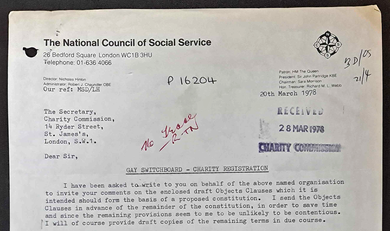
Partial transcript
GAY SWITCHBOARD – CHARITY REGISTRATION
I have been asked to write to you on behalf of the above named organisation to invite your comments on the enclosed draft Objects Clauses which it is intended should form the basis of a proposed constitution. I send the Objects Clauses in advance of the remainder of the constitution, in order to save time and since the remaining provisions seem to be me to be unlikely to be contentious.
GAY SWITCHBOARD – CHARITY REGISTRATION
I have been asked to write to you on behalf of the above named organisation to invite your comments on the enclosed draft Objects Clauses which it is intended should form the basis of a proposed constitution. I send the Objects Clauses in advance of the remainder of the constitution, in order to save time and since the remaining provisions seem to be me to be unlikely to be contentious.
Letter on behalf of Switchboard to propose their registration as a charity, 20 March 1978. Catalogue reference: CHAR 19/242
At the time of this initial application, the service ran 24 hours a day, seven days a week, and had received 117,000 calls in the previous year. This increased the following year, with 55 volunteers helping run the service.
Wide-ranging concerns
Switchboard’s application was met with various concerns by the Charity Commission.
Official letters show that the relevant decision-makers felt that ‘homosexuals [were] not a charitable class in themselves’, doubted the amount of people the helpline would support, and thought that their objective around ‘compassion and friendship’ was not enough to be a charitable aim (though this was only one aspect of their work). There were concerns about the organisation being used as a social agency to matchmake or signpost club nights. Indeed, the helpline did try and help callers find spaces where they felt safe or could meet likeminded people.
They also worried that Switchboard was partly a campaigning organisation, rather than being neutral. An undated, anonymous note in the file sums up some of the Charity Commission’s concerns:
‘QUESTION IS: Where is the emphasis – encouragement of homosexuals OR counselling?’
Their main objection related to the legal parameters. Under the Sexual Offences Act, same-sex acts between men had an ‘in private’ clause that was different for heterosexual couples, and a different age of consent. Correspondence shows the Charity Commission initially felt that ‘Homosexual acts [were] still criminal offences unless they are within the provisions of the Sexual Offences Act, 1967’, so they could not support Switchboard’s planned charitable aims. There had been recent test cases in law that supported this position. A returned letter from Switchboard staff expressed surprise that the Charity Commission seemed to consider ‘one million Londoners’ acts … [to be] still criminal’ (Bishopsgate Archives, SW 3/3).
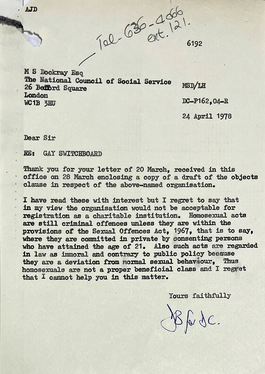
Partial transcript
Thank you for your letter of 20 March, received in this office on 28 March enclosing a copy of a draft of the objects clause in respect of the above-named organisation.
I have read these with interest but I regret to say that in my view the organisation would not be acceptable for registration as a charitable institution. Homosexual acts are still criminal offences unless they are within the provisions of the Sexual Offences Act, 1967, that is to say, where they are committed in private by consenting persons who have attained the age of 21. Also such acts are regarded in law as immoral and contrary to public policy because they are a deviation from normal sexual behaviour, Thus homosexuals are not a proper beneficial class and I regret that I cannot help you in this matter.
Thank you for your letter of 20 March, received in this office on 28 March enclosing a copy of a draft of the objects clause in respect of the above-named organisation.
I have read these with interest but I regret to say that in my view the organisation would not be acceptable for registration as a charitable institution. Homosexual acts are still criminal offences unless they are within the provisions of the Sexual Offences Act, 1967, that is to say, where they are committed in private by consenting persons who have attained the age of 21. Also such acts are regarded in law as immoral and contrary to public policy because they are a deviation from normal sexual behaviour, Thus homosexuals are not a proper beneficial class and I regret that I cannot help you in this matter.
Letter regarding the ‘acceptableness’ of Gay Switchboard as a charitable institution, April 1978. Catalogue reference: CHAR 19/242
Evidence and discussion
In an attempt to show the value of their work, Switchboard staff sent in pamphlets and educational material to demonstrate the need for a service that explicitly focused on the issues faced by lesbian and gay people. One of these was 1973's Homosexuality, a Family Doctor Booklet, written by psychiatrist FE Kenyon.
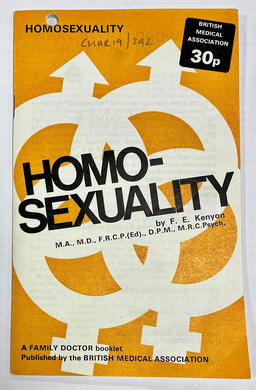
Homosexuality, a Family Doctor Booklet, published in 1973 by the British Medical Association. Catalogue reference: CHAR 19/242
This was a factual, educational booklet which explained what homosexuality was and the challenges it might present individuals with. The opening paragraph has been annotated by Charity Commission staff to note that homosexuality was ‘still...subject to the 1967 Act’.
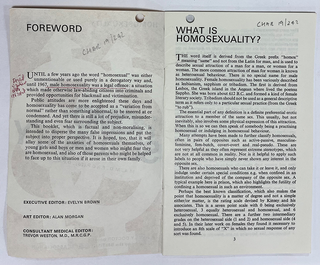
Annotation on preface of Homosexuality, a Family Doctor Booklet, noting the existing legal parameters. Catalogue reference: CHAR 19/242
The submission by Switchboard also included ‘Towards a Charter of Homosexual Rights’ by the Campaign for Reason, published in 1978. This listed 175 eminent people who supported gay rights, including 45 clergymen. The charter was ‘intended as a weapon in the battle against irrational prejudice.’
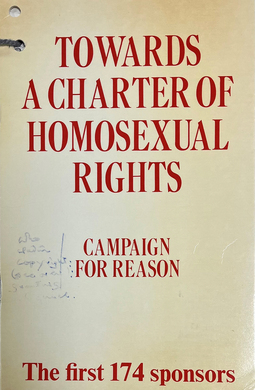
Copy of Towards a Charter of Homosexual Rights sent by Switchboard to the Charity Commission. Catalogue reference: CHAR 19/242
Despite the intention to educate and share prominent support for LGBTQ+ lives, such literature worried the Charity Commission. Was this evidence of the support service’s political goals, and use of ‘propaganda’?
Regardless of these submissions and meetings between Switchboard and the Charity Commission, their initial attempt to become a charity was turned down.
Success in the 1980s
Switchboard applied again to the commission in 1984. Their solicitors attempted to address each of the concerns raised in earlier attempts in a five-page letter, which they summed up as follows:
The issues raised by this case are of considerable public interest and importance. In view of the long and fruitless attempts made by our clients to obtain charitable status, we have considered the issues involved in some depth. In the process we have come to the conclusion that they are properly entitled to be registered as a charity.
Letter by Switchboard’s solicitors to the Charity Commission, 12 July 1984.
Discussion continued for some time. Particularly contentious was the language Switchboard included in their terms of reference: they wanted to use ‘despair’ or ‘distress’ to explain the experiences of some LGBTQ+ people who sought their services. The Charity Commission preferred the word ‘disability’ instead, reflecting attitudes that persisted within institutions at the time.
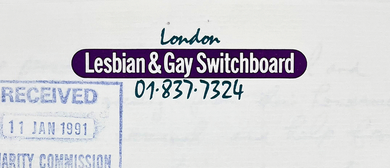
London Lesbian & Gay Switchboard's logo from 1981, from a letter header. Catalogue reference: CHAR 19/242
After considerable further correspondence, agreements were finally reached in 1987, and Switchboard finally became a registered charity. Although the majority of the 1967 Sexual Offences Act (which had been seen to stand in the way) was not updated until 2003, by the mid-1980s there had clearly been enough of a shift in views that the law was no longer seen as a barrier to Switchboard's charitable status.
Switchboard went on to support the LGBTQ+ community in many key moments over the following decades. It offered compassion and countered misinformation during the AIDS epidemic, and gave support during police raids of the 1980s, as well as after the homophobic bombing of the Admiral Duncan pub in 1999. You can hear about the experiences of Switchboard staff in the award-winning podcast The Log Books, based around day-to-day notes taken by volunteers who staffed the phones between 1974 and 2003.
Switchboard’s name has changed several times to reflect the changing understanding and language around sexuality and gender identity. It continues to support people in need to this day under the name Switchboard LGBT+ Helpline.
Records featured in this article
-
- From our collection
- CHAR 19/242
- Title
- Switchboard's application for registration as a charity
- Date
- January 1978 – December 1994
